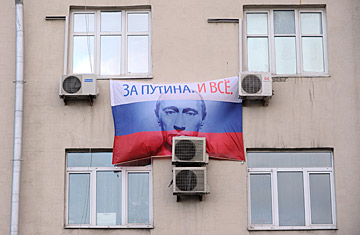
A campaign portrait of Russian Prime Minister and presidential candidate Vladimir Putin bearing the slogan "For Putin! And That's It!" is hung on a building in Moscow on March 2, 2012
At first it was hard to pinpoint what was missing. All the basic trappings of a presidential campaign were in place. The Olympic Stadium in Moscow was packed on Friday with supporters of one of the candidates, a young, handsome billionaire named Mikhail Prokhorov. There were pins, scarves and pamphlets embossed with his name. Children waved flags in the stadium bleachers. Journalists scampered about, trying to ask the candidate what he would do as Commander in Chief. But somewhere in the air, and on the people's faces, hung the sense that this was all a little pointless. The results of Sunday's presidential election, at least according to the front-runner, Vladimir Putin, had pretty much been decided several years ago.
That is what Putin told the nation on Sept. 24, when he announced that he would leave the post of Prime Minister and return to the presidency, which he already held between 2000 and '08. "I want to say it straight out," Putin declared that day during a congress of his political party, United Russia. "The agreement over what will be done in the future was reached between us several years ago." He was talking about the agreement he had made with his protégé, Dmitri Medvedev, who has kept Putin's presidential seat warm for him for the past four years. They have agreed to switch places this spring, with Putin again becoming President and Medvedev becoming Prime Minister, in a maneuver that was dubbed by Russian pundits as the rokirovka, or castling, a move in the game of chess in which the king and the rook switch places to protect the king.
Minutes later, when Putin had left the podium, Medvedev got on the stage and made an announcement that seemed out of sync with Putin's — or perhaps designed to calibrate it politically. "The most important thing," Medvedev said, playing his role as the more liberal of the two, "is that the choice always remains with ... the Russian people." And so began a six-month effort to slather the rokirovka in democratic paint.
Many people have resisted this. The rokirovka, according to opinion polls taken since September, was the leading reason why hundreds of thousands of people have taken to the streets in recent months to demand fair elections and true democracy. These have been the largest demonstrations against the government since the fall of the Soviet Union, and they have made this election the most exciting and contentious in a decade. But they did not make it any less predictable. Putin is still sure to win.
Clearing away all the fear mongering and populism that has defined Putin's campaign, its basic message could be whittled down to this: Who if not Vladimir Putin? The question is, of course, rhetorical. All of the candidates allowed to run against Putin in this vote feel like foils, sparring partners, intended to make him look like the stronger, saner and more effective man on the ballot.
Each of the rivals is also meant to soak up a specific segment of the protest votes. Gennadi Zyuganov, of the Communist Party, attracts the millions of mostly elderly voters who yearn for a return to the Soviet past, to central planning, nationalized industry and the ultimate nanny state. Vladimir Zhirinovsky, leader of the nationalist Liberal Democratic Party of Russia, appeals to Russia's roughneck demographic. Having once said on camera that U.S. Secretary of State Condoleezza Rice should be gang-raped by Russian soldiers, his rants make Rush Limbaugh sound like a roadie for the Grateful Dead. He and Zyuganov have run and lost in almost every presidential race since communism fell, and traditionally share about 20% of the vote between them.
